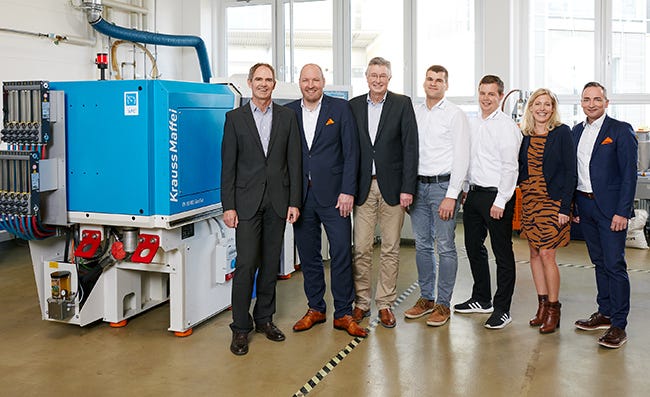KraussMaffei Partners with Plastics Processors to Optimize LSR Molding
The first goal of the partnership with SKZ and Toolcraft is the production of a 0.5-g medical component.
February 15, 2022

In a move to make the injection molding of liquid silicone rubber (LSR) more mainstream, KraussMaffei has partnered with German processors Kunststoff-Zentrum (SKZ) and Toolcraft to design an optimized LSR molding process.
Until now, LSR processing has been viewed as more of a specialty operation because of the material’s low viscosity and the fact that temperature control occurs in a manner opposite to that used for traditional thermoplastics.
The partnership’s first goal is a medical component weighing 0.5 grams. It is expected to take about two years to progress from research to moldmaking and process refinement. KraussMaffei has provided all-electric injection molding machines — a PX50 to SKZ and PX 121 to Toolcraft — and will consult on technical matters.
With excellent food-contact, thermal, and transparency properties, LSR is suited for applications ranging from baby pacifiers to seals for various parts. The trick, however, is processing it correctly.
“LSR shows an extremely low viscosity, especially highly transparent silicone,” explained KraussMaffei’s Petra Rehmet. “The viscosity could be compared to water. It requires high precision during the injection process but also in the mold technology. Furthermore, temperature and batch changes have an influence on the raw material’s viscosity. Operators have to pay attention if they want to avoid scrap.”
|
Partners venture into the world of optimizing LSR processing, from left: Prof. Martin Bastian, head of SKZ; Frank Burkhardt, sales for KraussMaffei; Georg Schwalme, head of injection molding area at SKZ; Markus Scheuerlein, moldmaking project manager at Toolcraft; Thomas Lender, head of injection molding at Toolcraft; Cordula Wieland, sales at KraussMaffei; and Christian Rössler, head of sales-South at KraussMaffei. |
This three-way partnership is being billed as a “triple-win” for realizing further applications in the medical and automotive industries and in consumer goods.
“We have a closely coordinated exchange between research and our technology development and can match this in parallel with real production data and experience,” Rehmet noted. “With that intense contact with all parties, we even improve our machine technology and dive deeper into mold technology as well as the latest process demands. Finally, we can all learn from each other, because we all have our special expertise in digitalization, data research, machine, mold, and process technology.”
KraussMaffei’s all-electric PX series machines were chosen for processing LSR because they allow “safe, stable processing of this low-viscosity material thanks to absolute platen parallelism. An exact shot weight consistency is guaranteed even with 256 cavities. Thanks to our Adaptive Process Control (APC), there is a consistently high component quality and, thus, minimum scrap. In addition, our digital solutions allow absolute transparency throughout the process.”
Furthermore, “the plasticizing unit used for LSR processing has special sealing to avoid leakage,” Rehmet continued. “Due to our modular machine setup, we are always able to provide the matching plasticizing unit for the customer’s product.” In combination with APC, the equipment can “react according to viscosity changes and real-time process documentation, which can be connected to a digital platform that allows remote control of the process stability for LSR part production.”
About the Author(s)
You May Also Like



